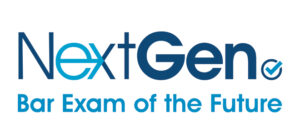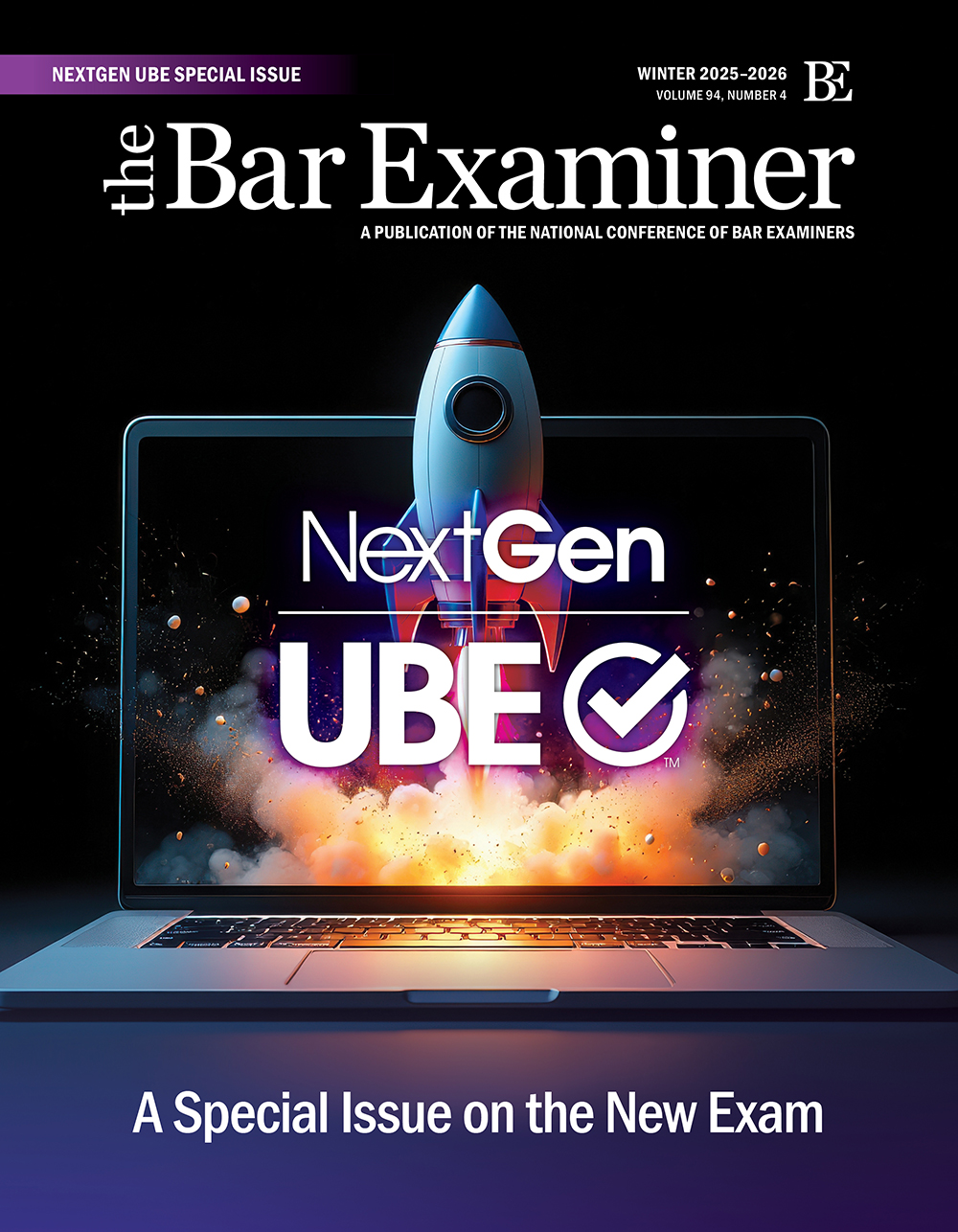By Marilyn Wellington
 Taking Stock and Taking Shape: NextGen Content Scope and Initial Sample Questions
Taking Stock and Taking Shape: NextGen Content Scope and Initial Sample Questions
Come this fall, the students who will have the first chance to take the NextGen bar exam will arrive at law schools across the country. NCBE has recently delivered critical information that will give the bar admissions and legal education communities a firmer sense of the new exam’s content and format. In May, NCBE published the content scope for the new exam, and in July, the first NextGen sample questions followed. While general information about the new exam, such as the foundational knowledge and skills areas to be tested, has been available for some time now, the release of outlines detailing the scope of content coverage and the first set of sample questions marks an important step forward, particularly for those core stakeholders within jurisdictions and at law schools who are beginning to solidify plans around the launch of the new exam in July 2026.
The NextGen content scope document provides in-depth outlines of the material that will be covered on the new exam, which will test eight foundational areas of legal knowledge and seven categories of practical skills and abilities (see sidebar). The content scope outlines provide a detailed review of the scope of coverage for each foundational knowledge area, while also delineating the depth of knowledge required for each topic. As the document sets out, for some foundational knowledge areas examinees will be required to show they can spot a legal issue and work efficiently with a selection of legal resources to provide analysis and problem-solve. For other areas, examinees will need to exhibit an in-depth knowledge of the doctrine without reliance on legal resources. For example, within the area of constitutional law, examinees will be expected to have in-depth knowledge of First Amendment freedoms such as regulation of protected and unprotected expression, while also being required to recognize issues arising in the context of related constitutional law doctrine such as prior restraint, vagueness, and overbreadth, using provided legal resources to help guide decisions about appropriate next steps.
The release of initial NextGen sample questions provides concrete examples of what examinees can expect on the new exam. These sample questions include both an “integrated question set” and examples of a type of multiple-choice question not currently used on the bar exam. These questions, some of hundreds currently under development, have been drafted by a dedicated group of legal experts, including law faculty and deans, practicing attorneys, and judges. More information on the sample questions, and the questions themselves, can be found here.
Each NextGen integrated question set will include a mixture of short-answer and multiple-choice questions based on a common fact scenario intended to mimic what a newly licensed lawyer would encounter in practice. Question sets may include supplemental documents (e.g., a police report or excerpt from a deposition) and/or legal resources (e.g., excerpts of statutes or judicial opinions) for examinees to consult in responding to the questions. Integrated question sets will test one or more areas of legal doctrine, along with the examinee’s ability to apply that knowledge with the use of lawyering skills to solve the problem at hand.
The multiple-choice questions will continue to test both legal analysis and application of black-letter law, and will include both Multistate Bar Examination (MBE)-style questions (featuring four possible answers and one correct response) and a new multiple-choice question type, which provides up to six answer options with one or more correct responses. As with the current exam, these questions provide multiple discrete opportunities for scorable responses and form the backbone of the equating process, which ensures stability in scoring between exam administrations.
Foundational Concepts & Principles
- Civil Procedure
- Contract Law
- Evidence
- Torts
- Business Associations
- Constitutional Law
- Criminal Law
- Real Property
Foundational Skills

- Legal Research
- Legal Writing
- Issue Spotting and Analysis
- Investigation and Evaluation
- Client Counseling and Advising
- Negotiation and Dispute Resolution
- Client Relationship
A third question type, not yet released, is modeled on the current Multistate Performance Test, which requires examinees to demonstrate their ability to use fundamental lawyering skills in realistic situations, completing legal writing assignments appropriate for a newly licensed lawyer. These tasks may feature areas of law, with accompanying legal resources, beyond those tested by the other question types. These areas of law might include, for example, family law, trusts and estates, or administrative law. One of the two longer writing tasks will include several multiple-choice and short written questions focused on research skills, followed by a longer writing assignment.
As discussed in my previous column, NCBE has been conducting research testing to assist in the development of the NextGen exam. During its first phase, pilot testing, these sample questions were administered to a diverse group of over 2,500 current law students and recent graduates from 70 volunteer law schools across the country. The results of this testing were then analyzed both by NCBE psychometricians and by members of the drafting teams to ensure the questions would perform as well as current bar exam questions, are free from testing bias, and are fair to all examinees. There were four total rounds of pilot testing, with the final round completed this spring.
The next stage of NextGen research testing, field testing, is scheduled to begin in January 2024. Through field testing, NCBE will obtain valuable performance data, confirm timing estimates for exam items, and test exam delivery and scoring systems. During this phase, jurisdiction bar exam graders will have an opportunity to grade the new constructed response questions, providing those individuals with an understanding of how grading will change with this new exam, as well as giving them the opportunity to offer feedback to NCBE.
For an in-depth look at the multiple stages of research testing NCBE is undertaking in preparation for the launch of the new exam, see my column in the Winter 2022–2023 issue of the Bar Examiner.
NCBE will continue to release sample questions throughout 2023 and 2024. As jurisdictions consider whether to adopt the NextGen exam for July 2026 or a future administration, and as the class of 2026 enters law school this fall, the new information contained in the content scope and the sample questions will help all stakeholders make informed decisions and prepare for the launch of the NextGen exam.
As an additional help to law schools and students, NCBE has announced that, starting with the July 2026 bar exam, the Multistate Essay Examination will no longer test conflict of laws, family law, trusts and estates, or secured transactions. This alignment of topics between the current and NextGen exams will enable students to select courses that will support their preparation for the bar exam, even if they don’t yet know which version they will take.
As we look toward the months ahead, I encourage you to follow the latest NextGen news on our website and by subscribing for email updates.
Available Online
Content Scope: nextgenbarexam.ncbex.org/reports/content-scope/
Sample Questions: nextgenbarexam.ncbex.org/nextgen-sample-questions/
To stay up to date on development of the future bar exam, subscribe to the NextGen website at nextgenbarexam.ncbex.org/subscribe.
 Marilyn J. Wellington is the Chief Strategy and Operations Officer for the National Conference of Bar Examiners.
Marilyn J. Wellington is the Chief Strategy and Operations Officer for the National Conference of Bar Examiners.
The Next Generation of the Bar Exam
In January 2021, the NCBE Board of Trustees approved the recommendations of NCBE’s Testing Task Force for the redesign of the bar examination to ensure that it continues to test the knowledge, skills, and abilities required for competent entry-level legal practice in a changing profession.
The board appointed an Implementation Steering Committee (ISC), which is charged with general oversight of the implementation of the findings and recommendations from the Testing Task Force study. NCBE has established multiple workgroups, working in consultation with the ISC, to develop the next generation of the bar examination and ensure a smooth transition for candidates, jurisdictions, and law schools. The workgroups include focus areas such as: test development and psychometrics; test delivery; diversity, fairness, and inclusion; and outreach. Workgroups focused on developing the content of the new exam and drafting exam questions are comprised of law professors, legal practitioners, and judges and justices.
This article originally appeared in The Bar Examiner print edition, Summer 2023 (Vol. 92, No. 2), pp. 6–8.
Contact us to request a pdf file of the original article as it appeared in the print edition.









